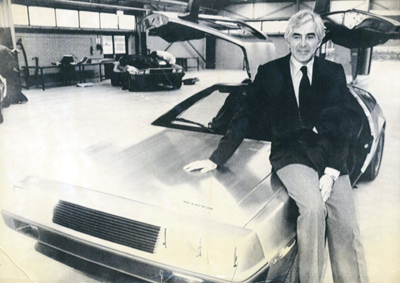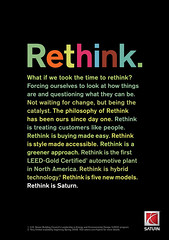Revised: (Not) Chortling over the auto industry's troubles

Anti-transit, pro-car cooperative automobile dealership ad from Canada.
----------
The revision clarifies some points, and renames the North American operations of General Motors as Saturn Corporation, and gives the company to the UAW. Before I had suggested this was an option. Now I think that's what should happen.
----------
I am not going to do that because I am from Michigan, and am a beneficiary of a once healthy auto industry and the monies it paid (in taxes) that supported the state universities in Michigan, one of which I was fortunate enough to attend on in-state tuition.
I wrote this on a new urban list, in response to a "what goes around, comes around post" focusing on GM and killing streetcars...
I am not a defender of the auto companies, even though I hail from Michigan. Still, I expect better argumentation from pro-urbanists/new urbanists. And university professors who suggest that a failing company like GM be responsible for rebuilding something very important like a mass public transit infrastructure.... as in "Have You Driven a Bus or a Train Lately?" from the New York Times.
1. GM contributed to the decline of streetcars
2. However, the systems had already been declining because of changes in mobility patterns, suburbanization and outmigration trends, and the Depression.
3. GM (and Ford and Chrysler's) failures have to do with not being able to change their business model to reflect new realities
4. Combined with legacy wage rates and labor agreements that were created at the time when the U.S. companies controlled much of the U.S. car market and a good portion of the worldwide market (except for Japan) and as a result are very high cost.
5. Plus the health care issue. The legacy companies pay pensions and health care costs (although this is changing) at much different rates compared to their competitors (because they have 100 years of business history in the U.S., and legacy employees).
As a business model, this worked when they had a significantly extranormal portion of the U.S. and global market for cars.
It doesn't work in a market which is vastly more competitive. Not to mention the gas guzzler issue, but that is a function of 3, 4 and 5 as well, because GM, Ford and Chrysler have a high cost production system, making smaller cars unprofitable. That's why they focused on selling big cars and trucks.
I would hope that any new urbanist would promote a more nuanced understanding of these issues.
Sadly, I was forever influenced by reading the book On A Clear Day You Can See General Motors by John DeLorean. I read it in 1980 or 1981. He forecasted all the problems as well as some solutions, back then. Although now it is 27 years later.

John Delorean, AP photo.
For a blog entry on DeLorean, read this: John DeLorean, R.I.P (Rocking Revitalization Part II)
Anyway, were I the czar of GM, I would slim down to three divisions: Chevy, Saturn (combining Pontiac and Buick), and Cadillac + trucks. I would go into bankruptcy to change the labor and pension agreements, slim down the dealership structure--the legacy companies have about 5x the number of dealerships compared to the foreign companies operating in the U.S.
I'd split into two companies and give the North American operations, renamed the Saturn Corporation, to the UAW for free in return for the UAW assuming pension and health obligations, and I'd slink off to Stuttgart and China and run the rest of the company--everything but the U.S. and Canada--from there. It would be an interesting business challenge for the UAW. I don't see how you can lay people off and pay them 95% of their salary to do nothing...
I would rename the North American corporation to Saturn Motors Corporation or Saturn Corporation (you know, like when International Harvester renamed itself Navistar Corporation). The international company could still be called GM.

(The Wall Street Journal had a big feature on this issue too, in the Saturday paper, but I didn't read anything in it that made me want to clip the piece.)
Chrysler to save jobs, could merge with Nissan-Renault...
-------
And this is interesting, speaking of rust belt revitalization, see "Technology belt plans grow" from the Pittsburgh Tribune-Review.
Labels: car culture and automobility



0 Comments:
Post a Comment
<< Home